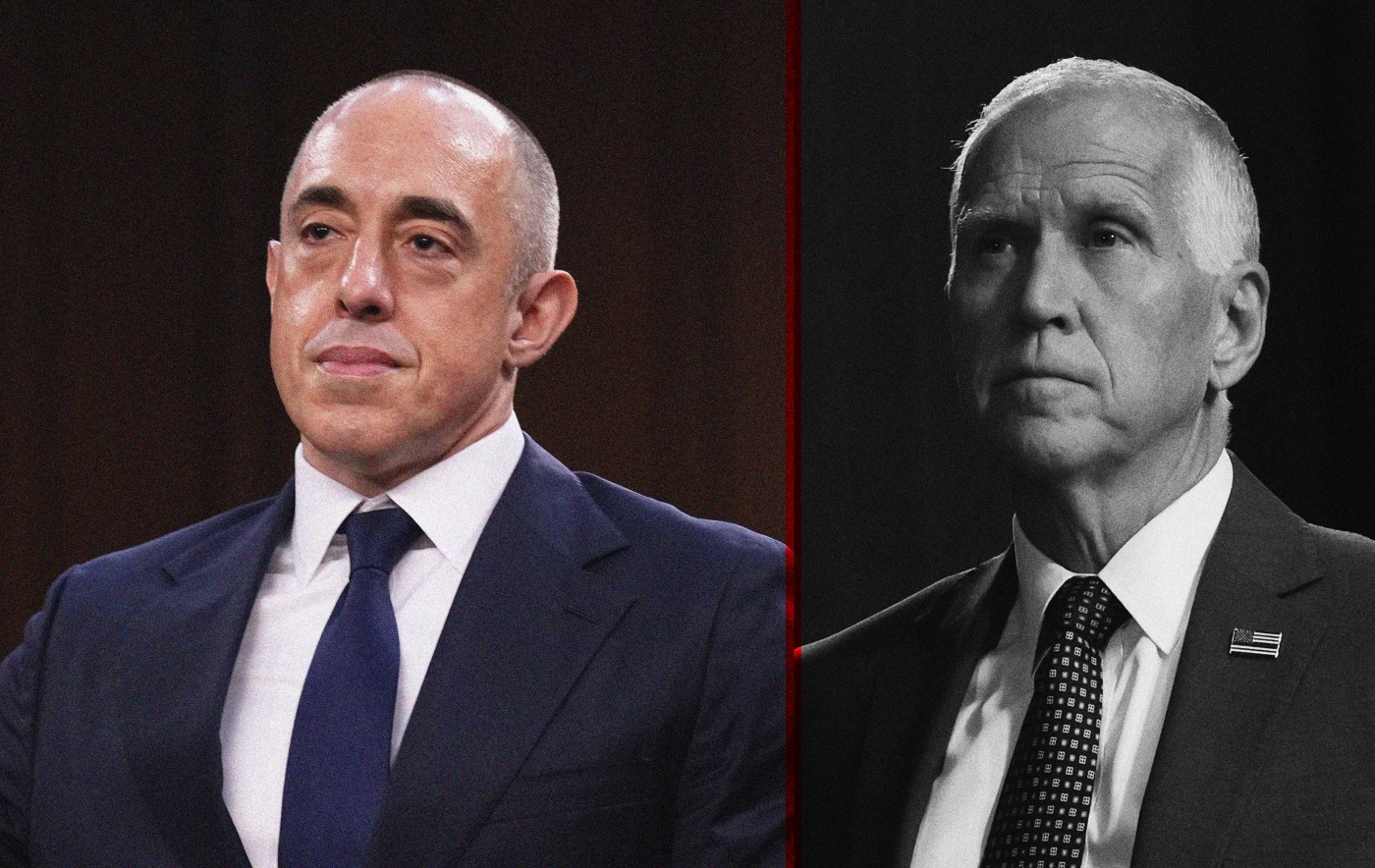The weekend before the July Fourth holiday, Republican Sen. Thom Tillis announced his retirement—and declared his own political independence.
“It’s become increasingly evident that leaders who are willing to embrace bipartisanship, compromise, and demonstrate independent thinking are becoming an endangered species,” Tillis said in a retirement statement that came as President Donald Trump was threatening to field a primary challenger to the North Carolina lawmaker over his refusal to support the GOP’s tax-and-spending bill. “I look forward to having the pure freedom to call the balls and strikes as I see fit,” Tillis added.
The “Big Beautiful Bill” that Tillis opposed passed without his vote, but this week would appear to provide him with a prime opportunity to flex his independence in a way that would actually be consequential. The Senate Judiciary Committee is slated on Thursday to hold a vote to advance the nomination of Emil Bove—Trump’s most controversial judicial nominee to date—and a “no” vote from a single Republican on the committee, such as Tillis, would keep the nomination from moving forward.
When Bove was first nominated to be a 3rd Circuit Court of Appeals judge, a number of conservative legal thinkers raised concerns about Bove’s record of putting loyalty to Trump above the rule of law—and warned that the Senate’s confirmation of Bove would send a message that Trump was free to remake the judiciary, up to and including the Supreme Court, with loyalists rather than the type of principled judicial conservatives he nominated in his first term.
Those concerns about Bove, Trump’s former personal lawyer who is now a top official at the Department of Justice, were primarily rooted in the DOJ’s politicized decision to drop corruption charges against New York City Mayor Eric Adams. Bove’s handling of the case led to a slew of resignations from conservative federal prosecutors and Justice Department employees. “If the Adams case stands for anything, it stands for the likelihood that when push comes to shove, [Bove is] not going to do the legally right thing. He’s going to do what the president wants, which isn’t always the same thing,” Andrew McCarthy, a former federal prosecutor and National Review writer, told The Dispatch last month. Tillis said of the Bove nomination shortly after it was announced: “I haven’t looked at it yet, but I’ll go into it objectively [and] independently.”
Flash forward a month and the case against Bove has only gotten stronger, but Tillis plans to cast a decisive vote in favor of Bove despite more evidence that Bove prizes fealty to the president over the law.
In June, a whistleblower stepped forward to detail Bove’s role in the Trump administration’s March 15 deportations of more than 100 migrants to a brutal Salvadoran prison under the Alien Enemies Act without due process and in defiance of a judicial order. Erez Reuveni, who served as a DOJ attorney for nearly 15 years before he was fired in April, alleged in his whistleblower complaint that at a March 14 meeting among DOJ officials, Bove contemplated the Trump administration defying a judicial order over the deportations. The next day, he allegedly advised the Department of Homeland Security (DHS) effectively to do just that.
According to Reuveni, Bove made a statement at the March 14 meeting “that DOJ would need to consider telling the courts ‘f--- you’” and ignore a court order regarding immigrants being deported to El Salvador.” Bove denies he made such a statement, but late last week, Reuveni’s contemporaneous text messages with another DOJ lawyer surfaced that substantiated that Bove had made such a statement. The emails released as part of the whistleblower complaint were first published by the ranking Democrat on the Senate Judiciary Committee, Dick Durbin.
Bove’s behavior on March 15—substantiated again by an email released as part of the whistleblower’s complaint—is even more troubling. That day, Judge James Boasberg told the Trump administration that people being deported under the Alien Enemies Act without due process must be returned to the United States: “You shall inform your clients of this immediately, and that any plane containing these folks that is going to take off or is in the air needs to be returned to the United States, but those people need to be returned to the United States.”
But Bove nevertheless advised the DHS on the evening of March 15 that the “deplaning of the flights that had departed US airspace prior to the court’s minute order was permissible under the law and the court’s order,” according to a March 16 email from a top DOJ official named Yaakov Roth that was released as part of the whistleblower complaint.
What does Tillis, the self-styled independent thinker, have to say about all of this? He has repeatedly said he intends to follow his “staff’s recommendation” to confirm Bove.
“Based on the information I have today, I have no reason to question my staff’s recommendation,” Tillis told The Dispatch on Tuesday.
Had Tillis actually reviewed the whistleblower claims and corroborating documents? “Let me tell you about how I feel about any revelations that come from a member’s office: You haven’t built enough [of a] case to convince one of these news outlets to break the story,” he replied. “So it feels a lot like a Brett Kavanaugh maneuver, rather than a substantiated, corroborated account, so it’s immaterial to my vote.”
But unlike the unsubstantiated and dubious allegations against Kavanaugh from the 1980s, the allegations against Bove are contemporaneous and backed up by original documents of an incident that happened a few months ago.
“It doesn’t seem to be fully corroborated and researched,” Tillis insisted, without saying whether he had personally reviewed the documents. “If it is, I’ll be interested in seeing a reputable journalist cover it.” News of the original whistleblower complaint was broken by the New York Times, and Politico reported on the release of the underlying text messages and emails. Tom Joscelyn and Ryan Goodman meticulously explain in an article at Just Security that the documents contradict Bove’s claims. “I see lots of reasons to believe Reuveni’s charges and not a single good reason to disbelieve them,” wrote Ed Whelan, a former clerk to Justice Antonin Scalia, DOJ lawyer under President George W. Bush, and a scholar at the Ethics and Public Policy Center (where I am a visiting fellow).
Bove’s handling of the Eric Adams case and the Alien Enemies Act deportations are not the only plausible grounds for rejecting his nomination. Bove purged prosecutors involved in cases stemming from the January 6, 2021, Capitol riot—despite the fact that Bove himself led efforts to prosecute January 6 rioters in New York. Bove wrote in a memo firing the January 6 prosecutors that “President Trump appropriately characterized” work related to prosecutions of Capitol rioters “as having involved ‘a grave national injustice that has been perpetrated upon the American people over the last four years.’”
January 6 seemed to be a red line for Tillis, following his retirement announcement. “The president should know if there is anyone coming up for a nomination through any committee of my jurisdiction, that excused January 6, that they’re not going to get confirmed in my remaining tenure in the U.S. Senate,” he told CNN on July 9.
Asked about how he squares his own comments with Bove’s behavior, Tillis told The Dispatch he did not believe Bove had crossed that line: “I’m talking about people who did serious harm to police officers and excusing that at any level.”
Tillis said this while wearing a pro-police “thin blue line” button on his lapel. I didn’t have a chance to ask him if he was aware that the Department of Justice under Bove recently hired a January 6 rioter to work on the “Weaponization Working Group.” Jared Wise, the rioter-turned-DOJ employee, called police “Nazis” on January 6, and according to the charging document against him, shouted to rioters attacking cops: “Kill ’em! Kill ’em! Kill ’em!”
Tillis’s decision to vote for Bove makes his confirmation quite likely, but not 100 percent certain. Sens. Lisa Murkowski and Susan Collins both told The Dispatch they didn’t know how they intended to vote when Bove’s nomination comes before the full Senate, but to date none of Trump’s nominees have been voted down once they’ve made it to a floor vote.







Please note that we at The Dispatch hold ourselves, our work, and our commenters to a higher standard than other places on the internet. We welcome comments that foster genuine debate or discussion—including comments critical of us or our work—but responses that include ad hominem attacks on fellow Dispatch members or are intended to stoke fear and anger may be moderated.
With your membership, you only have the ability to comment on The Morning Dispatch articles. Consider upgrading to join the conversation everywhere.